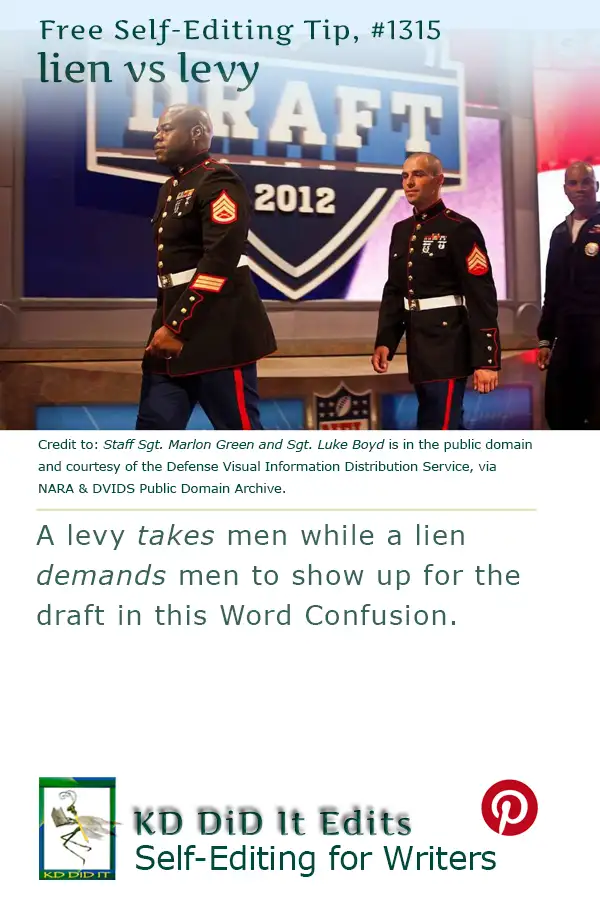I was reading of someone who had a lien imposed on them for work done on their house, and I got to wondering what the difference was between this word confusion levy vs lien.
A levy was originally a demand for troops to wage war and evolved into a legal seizure of your property to satisfy a debt.
A lien is a legal claim against your property to secure payment of your debt.
To sum it up, a lien is the claim while the levy actually takes.
Exploring Later . . .
You may be curious about the liable in “Liable versus Likely“.
Word Confusions . . .
. . . started as my way of dealing with a professional frustration with properly spelled words that were out of context in manuscripts I was editing as well as books I was reviewing. It evolved into a sharing of information with y’all. I’m hoping you’ll share with us words that have been a bête noire for you from either end.
If you found this post on “Levy versus Lien” interesting, consider subscribing to KD Did It, if you’d like to track this post for future updates.
| Levy | Lien |
|---|---|
 — |
 — |
| Part of Grammar: | |
| Noun; Verb, intransitive & transitive
Plural for the noun: levies Third person present verb: levies |
Noun
Plural: liens |
| Noun: An act of levying a tax, fee, or fine
[Historical] An act of enlisting troops
Verb, intransitive: Verb, transitive: [Archaic] To enlist (someone) for military service
|
Noun: [Law] A right to keep possession of property belonging to another person until a debt owed by that person is discharged |
| Examples: | |
| Noun: Union members were hit with a 2 percent levy on all pay. We all pay a fossil fuel levy in our electricity bills. There’s a vote coming up on an annual motorway levy on all drivers. “After the McCleary decision, the Legislature responded by significantly increasing state funding while implementing strict caps on levy requests to protect property owners” (Davis). Edward I and Edward II had made substantial use of the feudal levy for raising an army. We need lightly armed local levies. Verb, intransitive: Taxes should not be levied without the authority of Parliament. A new tax could be levied on industry to pay for cleaning up contaminated land. Verb, transitive: He sought to levy one man from each parish for service. They then proceeded without further ceremony to levy war upon the king. |
Noun: They shall be entitled to a lien on any lot sold. Make sure there are no liens against the car. They may assert a lien claim on your property. There’s a vendor’s lien on the property. |
| Derivatives: | |
| Adjective: leviable | Adjective: lienable Noun: lienor |
| History of the Word: | |
| Middle English, as a noun from the Old French levee, feminine past participle of lever meaning raise, from the Latin levare, from levis meaning light. | Mid-16th century from the French, via the Old French loien from the Latin ligamen meaning bond, from ligare meaning to bind. |
C’mon, get it out of your system, bitch, whine, moan . . . which words are your pet peeves? Also, please note that I try to be as accurate as I can, but mistakes happen or I miss something. Email me if you find errors, so I can fix them . . . and we’ll all benefit!
Satisfy your curiosity about other Word Confusions on its homepage or more generally explore the index of self-editing posts. You may also want to explore Book Layout & Formatting Ideas, Building Your Website, Formatting Tips, Grammar Explanations, Linguistics, Marketing Help & Resources, Publishing Tips, the Properly Punctuated, and/or Writing Ideas and Resources.
Resources for Levy versus Lien
Some of these links may be affiliate links, and I will earn a small percentage, if you should buy it. It does not affect the price you pay.
Apple Dictionary.com
Davis, Brett. “WA School Leaders Make Case for More Spending Despite Court-ordered Funding Bumps.” The Center Square. Washington Examiner. 2 Aug 2024. Accessed 4 Sept 2024. <https://www.washingtonexaminer.com/news/3108629/wa-school-leaders-make-case-for-more-spending-despite-court-ordered-funding-bumps/#google_vignette>. Article.
The Free Dictionary: lien, levy
Merriam-Webster: levy
Pinterest Photo Credits
Staff Sgt. Marlon Green and Sgt. Luke Boyd is in the public domain and courtesy of the Defense Visual Information Distribution Service, via NARA & DVIDS Public Domain Archive.


